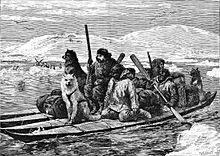Frederick Schwatka
Frederick Gustavus Schwatka (born September 29, 1849 in Galena , Illinois , † November 2, 1892 in Portland , Oregon ) was a lieutenant in the United States Army with degrees in medicine and law and an explorer in Alaska and northern Canada .
Life

In 1859 Schwatka's family, descended from German immigrants, moved to Salem , Oregon, where he later attended Willamette University . From 1867 to 1871 Schwatka was at the United States Military Academy at West Point , New York . In the following years he was used several times as an officer in the Dakota Territory . At the same time he studied medicine and law and was admitted to the bar in Nebraska in 1875 . The following year, he completed his medical studies at Bellevue Hospital Medical College of New York University from.
The search for survivors of Sir John Franklin's expedition in the 1860s sparked Schwatka's interest in the Arctic . When the American Geographical Society of New York started another, privately funded search operation in the late 1870s, Schwatka was put in charge. The expedition set out on June 19, 1878 for King William Island in the Canadian Arctic. Until the return two years later, the hoped-for documents were not found, but items from the Franklin expedition and the graves of some participants were found. By overcoming over 5,200 km, the expedition set a new record for sled trips. William H. Gilder , second expedition leader and correspondent for the New York Herald , reported on the expedition.
In 1883, the year after his marriage to Ada Josephine Brackett, the United States Army sent Schwatka on a reconnaissance expedition to the Yukon River . He sailed the river for around 2,500 km from its source to its mouth in the Yukon-Kuskokwim Delta , which was the longest raft trip in history at the time. Shortly after his return he resigned from the army, but continued to conduct expeditions.
Between 1886 and 1891 he led two private explorations into Alaska and three into northwestern Mexico . He lectured and published several popular reports on his observations of flora and fauna, the way of life of indigenous peoples, and survival techniques in remote areas.
Because of stomach problems in later years, Schwatka took tincture of opium . On November 2, 1892, he died of an overdose of the substance.
Frederick Schwatka was a member of the Freemasonry Association , his lodge was St. John's Lodge No. 37 , was in Yreka ( California ).
Honors
A number of geographical objects are named after Frederick Schwatka :
- the Schwatka Mountains ( 67 ° 18 ′ N , 154 ° 45 ′ W ), a mountain range of the Brooks Range in northwest Alaska,
- the Schwatka Lake ( 60 ° 41 ' N , 135 ° 2' W ), a reservoir of the Yukon at White Horse ,
- the Schwatka Islands ( 67 ° 53 ′ N , 97 ° 50 ′ W ), a group of islands in the Sherman Basin in Nunavut ,
- the Schwatka Bay ( 68 ° 42 ' N , 95 ° 40' W ), a bay of Rasmussen Basin in Nunavut,
- the Schwatka Creek ( 61 ° 33 ' N , 135 ° 59' W ), a tributary of the Yukon.
Works
- Frederick Schwatka: The Search for Franklin . Nelson & Sons, Edinburgh / New York 1882 ( archive.org ).
- Frederick Schwatka: Along Alaska's Great River . Cassell & Company, New York 1885 ( archive.org ).
- Frederick Schwatka: Nimrod in the North . Cassell & Company, New York 1885 ( archive.org ).
- Frederick Schwatka: Children of the Cold . Cassell & Company, New York 1886 ( archive.org ).
- Frederick Schwatka: In the Land of Cave and Cliff Dwellers . Cassell & Company, New York 1893 ( archive.org ).
- Frederick Schwatka: A Summer in Alaska . JW Henry, St Louis 1894 ( archive.org ).
literature
- Jonathan Dore: Schwatka, Frederick . In: Mark Nuttall (Ed.): Encyclopedia of the Arctic . tape 1-3 . Routledge, New York and London 2005, ISBN 0-203-99785-9 , pp. 1847–1849 ( limited preview in Google Book Search).
Web links
Individual evidence
- ^ William H. Gilder: Schwatkas Search: Sledging in the Arctic in Quest of the Franklin Records (1880)
- ↑ Famous Freemasons Frederick Schwatka , Homepage: Grand Lodge of British Columbia and Yukon (Retrieved April 25, 2012)
| personal data | |
|---|---|
| SURNAME | Schwatka, Frederick |
| ALTERNATIVE NAMES | Schwatka, Frederick Gustavus |
| BRIEF DESCRIPTION | American explorer in Alaska and northern Canada |
| DATE OF BIRTH | September 29, 1849 |
| PLACE OF BIRTH | Galena , Illinois |
| DATE OF DEATH | November 2, 1892 |
| Place of death | Portland , Oregon |
